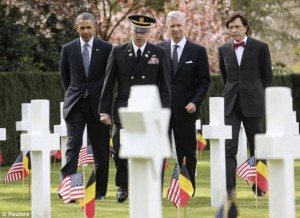
As usual, I find myself indulging a cold, heartless, over-intellectualized response to the story of the moment — which ought to have, and is meant to have, every human heart on the globe beating in sympathy. At the moment, the story of the moment, buttonholing us like the Ancient Mariner and demanding our tears or else, is the missing Malaysian airplane.
Sorrow for the passengers — undoubtedly all dead, one way or another, by now — and their families, will be well, and extensively, and facilely handled by the official organs of opinion and manufacturers of mass sentiment. This is a relief; the job is in excellent professional hands, far more skilled than mine, and I can leave it to them with a clear conscience.
The murderous modern world at least gave the passengers on that unlucky flight a relatively quick quietus, or so we can reasonably hope. This sometimes seems like a not-bad alternative to other ways of extinction on the carte du jour — like, say, freezing to death in a cobbled-together cardboard shelter on the steps of the local public library or parish church, which is a fairly common and unremarkable event in my town.
Peace to their ashes. As if it weren’t bad enough to be alive on an airplane, these poor devils had to die on one. Quick, okay, but who wants to die in the kind of company you find on an airplane?
What interests me, of course — being, as I am, a cold, heartless fellow, and so on — is the cultural response to this latest aircraft horror. Conventional tropes have been deployed, but there are a few new wrinkles.
Anything involving airplanes touches us to the quick, doesn’t it? At least half the horror of Nineleven(tm) lies in the fact that it was done with airplanes. The very emblems of our globe-straddling ‘civilization’ were turned against us.
This goes back a ways. I’m old enough to remember when airplane hijackings first became a fad — though aircraft have been hijacked as long as there have been aircraft. The history of aircraft hijackings is fascinating, and well worth reading.
Though the history is so old, moral panic on the subject is more recent. The first few times I ever boarded an aircraft, nobody searched me, or put me through a metal detector, or asked me for ID. Then came the metal detectors, then the X-ray machines, and finally the ID obsession — which I always thought was promoted by the airlines themselves, in order to kibosh the secondary market in airplane tickets. The ID craze started some years before Nineleven(tm); and of course all the Nineleven hijackers had perfectly good ID.
Nowadays you have to take off your belt, and your shoes, and empty your pockets, and submit to some perv’s nude-photography kink, before you can take your seat on an airplane. (I love the nude-photography thing, by the way; I figure that a glimpse of my nude physique would cure any voyeur, if anything could.)
Surely it’s clear that this is all liturgy, apotropaic magic, a series of rites meant to preserve the Holy of Holies from contamination?
More than anything else, air travel makes us feel that we have slipped the surly bonds of earth(*). We can get on an airplane, and within hours — having propitiated the Airplane Gods with the usual self-abasements — we can be at dying Granny’s bedside, or in bed with a lissome Thai girl. Air travel makes us feel in control, and for just that reason — I think — arouses an old and well-founded fear of hubris. The hijacker, actual or potential, takes shape in our imagination as the personification of Nemesis, a venerable ancient goddess whose sway we all acknowledge, consciously or not. The suety TSA junk-groper, in his ugly ill-fitting uniform and latex gloves, is the priest who absolves us from our presumption and sends us sinless on our way.
Prominent among the official responses to the disappearance of flight 370 was a complaint that our world isn’t controlled and surveilled enough. How, we ask, can an airplane just disappear? That isn’t supposed to happen. All those satellites, all that radar — isn’t that supposed to eliminate the realm of the unknown?
Personally, I’m rather glad there are still uncharted seas, and places where something as big as an airplane might simply disappear. I have a notion that I might like to disappear myself someday.
No doubt few of the passengers on Flight 370 had disappearance in mind; but if you have to disappear, there’s a certain grandeur in disappearing without a trace.
————
(*) From one of the worst poems ever, even if an Irishman did write it. Quite suitably cited by that drooling old fool, Ronald Reagan, with his repertoire of two second-rate actor’s tics, and his confectionery hairdo, and his ruined rouged cheeks, on the occasion of another spectacular failure of instrumental rationality and technological presumption:






